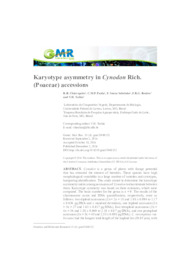Karyotype asymmetry in Cynodon Rich. (Poaceae) accessions.
Karyotype asymmetry in Cynodon Rich. (Poaceae) accessions.
Author(s): CHIAVEGATTO, R. B.; PAULA, C. M. P.; SOUZA SOBRINHO, F. de; BENITES, F. R. G.; TECHIO, V. H.
Summary: Abstract Cynodon is a genus of plants with forage potential that has attracted the interest of breeders. These species have high morphological variability in a large number of varieties and cytotypes, hampering identification. This study aimed to determine the karyotype asymmetry index among accessions of Cynodon to discriminate between them. Karyotype symmetry was based on three estimates, which were compared. The basic number for the genus is x = 9. The results of the chromosome count and DNA quantification, respectively, were as follows: two diploid accessions (2n = 2x = 18 and 1.08 ± 0.094 to 1.17 ± 0.036 pg DNA and ± standard deviation), one triploid accession (2n = 3x = 27 and 1.63 ± 0.017 pg DNA), four tetraploid accessions (2n = 4x = 36 and 1.88 ± 0.069 to 2.10 ± 0.07 pg DNA), and one pentaploid accession (2n = 5x = 45 and 2.55 ± 0.098 pg DNA). C. incompletus var. hirsutus had the longest total length of the haploid lot (29.05 µm), with chromosomes that ranged from 1.7 to 6.2 µm in length. On the basis of the karyotype asymmetry indices, the accessions were divided into two groups: 1) C. dactylon var. dactylon, C. transvaalensis, C. dactylon var. polevansii, three accessions of Cynodon sp, and C. nlemfuensis; and 2) C. incompletus var. hirsutus. This is the first description of tetraploidy in C. transvaalensis. The karyotypic data facilitated a determination of the degree of proximity between the accessions.
Publication year: 2016
Types of publication: Journal article
Unit: Embrapa Dairy Cattle
Keywords: Chromosome symmetry, Cynodon, DNA content, polyploidy
Observation
Some of Embrapa's publications are published as ePub files. To read them, use or download one of the following free software options to your computer or mobile device. Android: Google Play Books; IOS: iBooks; Windows and Linux: Calibre.
Access other publications
Access the Agricultural Research Database (BDPA) to consult Embrapa's full library collection and records.
Visit Embrapa Bookstore to purchase books and other publications sold by Embrapa.

